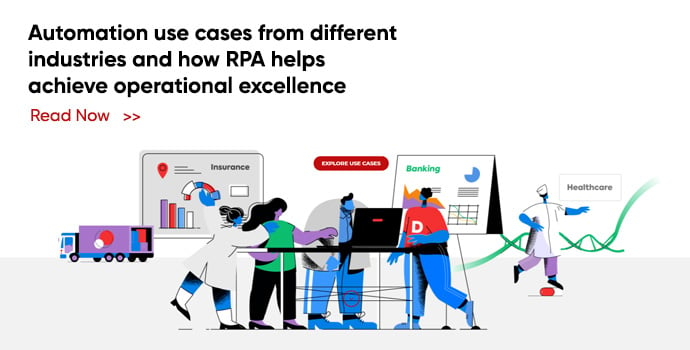Expedite the Paycheck Protection Program (PPP) with intelligent RPA
by Mitul Mehta, on May 26, 2020 4:15:24 PM
Estimated reading time: 4 mins
Tough times don’t last; tough people do. Globally, we have seen unprecedented times that have disrupted life as we know. As we move into a new era, more specifically the COVID-19 and post COVID-19 era, the business challenges have clearly transformed, if not escalated. With every business entity, whether big or small, having been hit by the novel threat, we as a human race have stepped into a new world order, which clearly mandates digital and technology-enabled services for the long haul. The world over, federal governments have already played the role of the big brother by doling out timely SOPs for businesses, such as the Small Business Administration Paycheck Protection Program (SBA PPP), it is over to banks and businesses now to play the role of the proverbial “Noah” in individual sectors by embracing digital transformation.

Being Noah – Banks enact the role for expediting PPP in a race against time
Federal SOPs such as the PPP are now the lifeline of sagging industries. However, both the banks and the industries have to fulfil the statutory mandates and documentation in a timely manner as the SOPs are deadline-driven. This arrangement is specifically required so that one ripple turns into an avalanche and spurs the sagging economy in a top down manner. Many such timely ripples gain momentum to affect the national GDP. Yes, technology, more specifically Robotic Process Automation (RPA), helps the banks to galvanize this change.
RPA has been around for some time now. This technology took root in order to reduce latency in processes due to repetitive data entries in different systems. Simply put, RPA automates processes and reduces the time required in swivel chair operations. It reads data from e-forms, Excel files, spreadsheets, user interface screens, pdfs, scanned documents, etc., validates it, transfers it into core banking systems and expedites tedious banking processes. Similarly, in case of the PPP program, RPA quickly validates the eligibility and authenticity of the applications while weeding out exclusions. Subsequently, it inputs the data in the core banking system from the workings done in multiple files in each and every PPP loan application case with high accuracy. In case of shortcomings or discrepancies in the loan application files, the RPA enabled system triggers flags to weed out the same and gives the go-ahead to disburse the loan only after the statutory obligations are fulfilled. In the case of scanned forms, Intelligent Data Capture tools enable the system to ingest the data and input the same in the core banking system.
This approach enables both the SBA authorities and the banking institutions to expedite the processing of high volumes of PPP loans and enables them to conserve their limited resources for the audit work and focus on high return yielding activity. Even as the SBA PPP program undergoes revisions, the balance cases, which are yet not processed can be quickly reverted to fulfill the latest compliance norms. Simply put, despite the sudden surge in transactional volumes the federal government and the banks can quickly enable the small business concerns to stand up in the devastating fall-outs of the pandemic as well as enable their resources to stand up taller.
The RPA benefits that help to speedily execute SBA PPP
When it comes to executing federal government mandates and SOPs, the speed and accuracy of the process is key. RPA bots bring to the table a set of benefits that enable banks to increase throughput and the first time pass certainty.
- High accuracy: RPA executes repetitive, rule-based tasks to the T. With the capability to deliver 24x7, RPA-enabled processes allow enterprises to deliver high accuracy output in 1/10th of the time required for executing the same volume of manual operations.
- Quick deployment: The RPA bots can be quickly programmed and tailored to suit any simple to complex processes that involve two-way data transfer between multiple systems. Even while accommodating the number of peaks in the workloads encountered from time to time, RPA delivers high work volumes.
- Faster execution: RPA solutions have a proven record of fast execution in banking, financial services, and insurance domain. The speedy execution across multiple touch points involving multiple systems, makes RPA the silver bullet for all data-intensive processes.
- Low cost: RPA offers cost-efficient solutions for BFSI use cases. With clear precedents established across RPA success stories in the banking, financial services, and insurance sector, RPA bots reduce operational costs by a whopping 40 to 60%.
- Safe and secure: RPA is a highly secure technology as it is segregated into two different modules – design and cockpit. As the design and execution process is clearly differentiated, it helps the banking enterprises to build fool-proof, top-down process architecture.
- High compliance: Though a high-speed process execution technology, RPA generates audit-trails for each and every step in simple to complex processes. These records help in fulfilling statutory audit requirements in data- & process-intensive industries including BFSI.
RPA use cases for ensuring business-readiness
In summary
RPA enables the banks and the SBA authorities to fulfill statutory mandates even amidst the massive rush and impending deadlines. The RPA solution enables to validate the data in the Excel file based workings presented by the small business concerns and quickly input the data in the core banking systems. Being fast, accurate, and intelligent, the RPA bots speedily aggregate the data, fulfill cross validations, and raise flags, if required, for the small business concerns to take corrective actions in case of discrepancies. The massive scale synergies pulled over extended geographies and states enable the SBA authorities and banks to successfully execute the PPP program in a race against time.
Next reading
- White paper - Being business-ready - Supersede the COVID-19 menace with Digital Technologies
- Ensure business continuity in times of COVID-19 pandemic by using ECM solutions
- Confluence of Digital Technologies – Not just for Business Continuity but for Exponential Growth
- Boost revenue generation for retail and digital marketplace with Intelligent Automation powered hyper-personalization


















